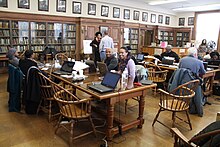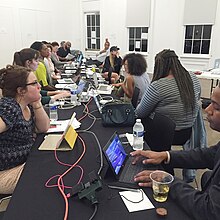
Back Bias rasial di Wikipedia ID Kecenderungan perkauman di Wikipedia Malay Viés racial na Wikipédia Portuguese
The examples and perspective in this article deal primarily with the United States and do not represent a worldwide view of the subject. (May 2015) |


The English Wikipedia has been criticized for having a systemic racial bias in its coverage. This bias partially stems from an under-representation of people of color within its volunteer editor base.[1] In "Can History Be Open Source? Wikipedia and the Future of the Past," it is noted that article completeness and coverage is dependent on the interests of Wikipedians, not necessarily on the subject matter itself.[2] The past president of Wikimedia D.C., James Hare, asserted that "a lot of [Black American history] is left out" of Wikipedia, due to articles predominately being written by white editors.[3] Articles about African topics that do exist are, according to some, largely edited by editors from Europe and North America and thus, they only reflect their knowledge and their consumption of media, which "tend to perpetuate a negative image" of Africa.[4] Maira Liriano of the Schomburg Center for Research in Black Culture has argued that the lack of information regarding Black history on Wikipedia "makes it seem like it's not important."[5]
| Part of a series on |
| Discrimination |
|---|
 |
Different theories have been provided to explain these racial discrepancies. Jay Cassano, writing for Fast Company magazine, argued that Wikipedia's small proportion of Black editors is a result of the small Black presence within the technology sector, and a relative lack of reliable access to the internet.[5] Katherine Maher, executive director of the Wikimedia Foundation, has argued that the specific focuses in Wikipedia's content are representative of those of society as a whole. She said that Wikipedia could only represent that which was referenced in secondary sources, which historically have been favorable towards and focused on white men.[6] "Studies have shown that content on Wikipedia suffers from the bias of its editors – [who are] mainly technically inclined, English-speaking, white-collar men living in majority-Christian, developed countries in the Northern hemisphere."[7]
In addition to the racial bias on Wikipedia, public encyclopedias are generally vulnerable to vandalism by hate groups, such as white nationalist groups.[8]
- ^ Melamed, Samantha. "Edit-athon aims to put left-out black artists into Wikipedia". Philly.com. Archived from the original on 4 March 2016. Retrieved 13 April 2015.
- ^ Rosenzweig, Roy (1 June 2006). "Can History Be Open Source? Wikipedia and the Future of the Past". Journal of American History. 93 (1): 117–146. doi:10.2307/4486062. ISSN 0021-8723. JSTOR 4486062.
- ^ Smith, Jada (20 February 2015). "Howard University Fills in Wikipedia's Gaps in Black History". The New York Times. Archived from the original on 23 February 2015. Retrieved 13 April 2015.
- ^ Goko, Colleen. "Drive launched to 'Africanise' Wikipedia". BusinessDay. Archived from the original on 6 July 2015. Retrieved 13 April 2015.
- ^ a b Cassano, Jay (29 January 2015). "Black History Matters, So Why Is Wikipedia Missing So Much Of It?". Fast Company. Archived from the original on 10 May 2015. Retrieved 13 April 2015.
- ^ Lapowsky, Issie. "Meet the Editors Fighting Racism and Sexism on Wikipedia". Wired. Archived from the original on 14 November 2015. Retrieved 13 April 2015.
- ^ Boboltz, Sara (15 April 2015). "Editors Are Trying To Fix Wikipedia's Gender And Racial Bias Problem". Huffington Post. Archived from the original on 21 August 2017. Retrieved 20 August 2017.
- ^ Klein, Adam (1 November 2012). "Slipping Racism into the Mainstream: A Theory of Information Laundering". Communication Theory. 22 (4): 427–448. doi:10.1111/j.1468-2885.2012.01415.x. ISSN 1050-3293.